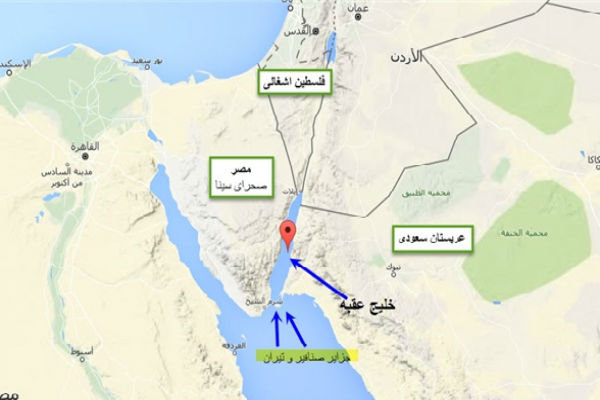America to station in Tiran and Sanafir; intensifying competition between Washington and Beijing

Late April, the Arabic website “Mada Masr” cited Cairo security officials claiming that Riyadh recently proposed to Washington the establishment of a military base on the islands of tiran adn Sanafir.
Mehr News Agency, International group: In late April, the Arabic website Mada Masr, citing Cairo security officials, claimed that Riyadh recently proposed to Washington the establishment of a military base on Tiran and Sanafir islands. These islands, transferred by el-Sisi to Saudi Arabia in 2016, are located at the entrance of the Gulf of Aqaba and hold notable geopolitical importance in the region.During Trump’s upcoming visit to Saudi Arabia in May this year, discussions about establishing a U.S. military base on Tiran-Sanafir are expected to be on the agenda.
On the other hand, egyptians strongly oppose this decision, viewing it as a threat to Suez Canal security and Egypt’s internal stability. After reports surfaced, Saudi Arabia justified its proposal as ensuring Suez Canal security and preventing arms smuggling to Palestinian-Lebanese resistance groups! Though, Egyptian Major General Samir Farag and Saudi analyst Ahmed Al-Shihry dismissed these claims during an interview with BBC, stating their purpose was merely to sow discord between Cairo-Riyadh!
Why Are Tiran-Sanafir Islands Significant?
For Egypt—though transferring ownership faced domestic criticism—the move is geopolitically interpreted as part of Cairo’s strategy to maintain its alliance with Riyadh while securing financial-political support from saudi Arabia. Egypt benefited from Saudi economic aid during internal crises through this arrangement.
Militarily, these islands serve as strategic points for monitoring maritime movements by non-state actors or terrorist threats in Sinai and Red Sea regions. Their proximity to Egypt’s economic lifeline—the Suez Canal—further underscores their security necessity. For both nations beyond territorial claims they function as diplomatic-security tools within complex regional equations playing key roles balancing power against rivals like Iran or Israel (though unnamed).
From America’s perspective due largely thanks strategic positioning near Strait Of Tiran vital shipping lanes Red sea; high geopolitical-military value makes them critical pieces within CENTCOM-led regional-security framework safeguarding freedom navigation protecting allies (Saudi-Egypt-Israel). White House indirectly monitors via existing bases agreements naval cooperation w/Saudi-Egyptian forces enabling surveillance over resistance activities preventing threats Eilat Port-international trade routes while countering China-Russia influence Indian Ocean theater through enhanced presence here too if realized would strengthen US posture vis-à-vis Beijing-Moscow competition northwardly adjacent waters accordingly analysts note…
Escalating US-China Geostrategic Rivalry
First proposed March 2017 aimed at countering Russia Red Sea expansion recent developments have revived Riyadh’s push now under second Trump governance despite current focus Ukraine-Gaza-Iran files eventually shifting attention toward China primary challenger global order per bipartisan consensus among elites seeking decouple Moscow-Beijing axis redefine Middle East security via Abraham Accords framework rather some argue borrowing Cold War tactics stifling Belt Road Initiative offering alternatives like IMEC corridor inducing geopolitical suffocation so why Aqaba foothold fits broader indo-MiddleEast-Europe corridor puzzle completion efforts underway…
Redesigning Red Sea Security Architecture
Better put: America seeks redesign entire architecture deploying troops Eritrea Djibouti KSA possibly even aforementioned islands granting CENTCOM-US Navy tighter control over shipping lanes while leveraging allied intel curbing Gaza-Lebanon resistance support networks though skeptics argue real goal expanding Indian Ocean surveillance against chinese encroachment wherein Cairo’s green light-or-resistance proves decisive factor since despite transfer April ’16 final say remains whether honoring past accords pursuing divergent path altogether…


